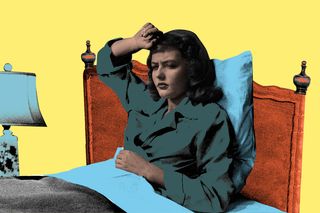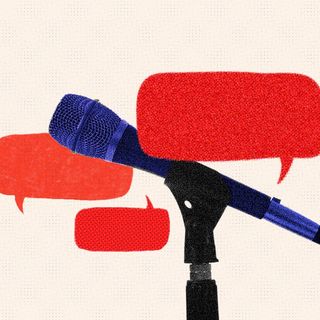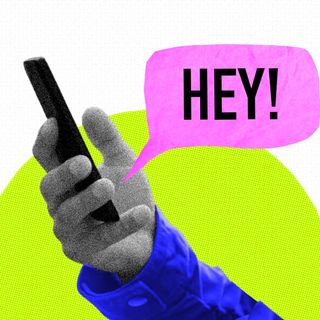
Is This Normal? “I Can’t Make Myself Go To Bed on Time”
Differences in circadian rhythms determine our chronotype — determining whether we’re “morning larks” or “night owls.”

In this series, we dig into our strange phobias, fixations, and neuroses, and ask ourselves — Is This Normal?
I spend all day wanting to take a nap. But, at night, I feel too lazy to go to bed — because, ironically, I often feel too energized, then, to do the things I should’ve done through the course of the day. In college, my friend used to say that the only way to align my sleep schedule with the rest of the world is by boarding the “sleep bus” before it pulls out of the stop. But it seems as though my “sleep bus” only operates during the day — once in a blue moon, even if I’m almost dropping dead with exhaustion and somehow manage to plonk myself on the bed at an “acceptable” hour, it’s like my sleep says, “Bazinga!” and disappears into thin air, as I lay wide awake, at my wit’s end.
Is this normal? I’m not sure. As it turns out, it’s rather common, though; I’m not the only one missing the regular “sleep bus” with my unusual timings.
There’s, in fact, a disorder called the Delayed Sleep Phase Syndrome (DSPS). Also known as delayed sleep-wake phase disorder, DSPS is said to occur when compared to the conventional sleep pattern, one’s schedule is delayed by two or more hours — resulting in one falling asleep later than others, and consequentially, waking up later. Our sleep-wake cycles are regulated by cyclical processes known as circadian rhythms — our bodies’ natural, internal clocks. And DSPS is essentially a sleep disorder pertaining to people’s circadian rhythms. Differences in circadian rhythms determine our chronotype, which is the likelihood of a person to sleep at a particular time during the 24 hours. And it’s this chronotype that determines whether we’re “morning larks” or “night owls.”
Research suggests that 40% of human beings fall in the “night owl” category. This begs the question: does a mere difference in circadian rhythms automatically assume the form of disorder? Perhaps, not per se. But navigating a world dominated by the ‘nine-to-five’ work culture while being a “night owl” can certainly feel like living with a disorder among “normal” people. Especially so, when we have grown up in a world that tries to drill the benefits of rising early into our minds from a very, very tender age — with poems even saying, “Early to bed and early to rise, makes a [person] healthy, wealthy, and wise.”
Related on The Swaddle:
How Sleeping Next to Our Partners Can Improve Our Health and Wellbeing
DSPS can occur to people due to a number of factors — ranging from our genetic disposition to living with different forms of neurodivergence like autism, ADHD, or OCD to even our surroundings. What experts note is that being exposed to too much light at night, or not being exposed to enough light during the daytime, can make it difficult to fall asleep “on time.” Chronic insomnia or anxiety, too, can pose challenges to the act of drifting off to sleep at what is considered by the world to be a “normal bedtime.” As an autistic person living with ADHD and anxiety, it’s hardly surprising, then, that sleep chooses to evade me at night.
Then, of course, there’s the concept of Revenge Bedtime Procrastination (RBP) — derived from the Chinese expression “bàofùxìng áoyè.” RBP refers to a decision — conscious or subconscious — that people in high-stress, time-consuming jobs often find themselves making, simply to sneak in a few hours of “me” time that their responsibilities didn’t permit them to include in the course of the day. “[It] describes the decision to sacrifice sleep for leisure time that is driven by a daily schedule lacking in free time. For people in high-stress jobs that take up the bulk of their day, [RBP] is a way to find a few hours of entertainment even though it results in insufficient sleep,”explains an article by Sleep Foundation.
The practice, however, costs one their own health — it’s ironic, then, that despite our urge to seek revenge from our bosses, uncooperative partners, socio-economic conditions, or whatever and whoever else is responsible for depriving us of our “me” time, we end up hurting ourselves. As the article continues, “Although revenge bedtime procrastination can be tempting in the moment, late nights followed by early mornings can directly lead to serious sleep deprivation. Cutting back on sleep can have significant negative effects on mental, physical, and emotional health with short- and long-term consequences.”
Related on The Swaddle:
Why People Living With ADHD Are Often Misjudged As ‘Lazy’
RBP can, perhaps, be dealt with. But being part of the tribe of the 40% (with skewed circadian rhythms) means living with a constant tussle between: trying to keep up with the fortunate early birds, whose body clocks are the ones that the work culture caters to; while ensuring we don’t deprive ourselves of shut-eye through the day by careful planning it in a manner that would allow us to sneak in naps every now and then. Is that the healthiest way? No, certainly not. But our owl-ness doesn’t come with the kind of magical wisdom that would allow us to flick a wand and make the world more accommodating of people whose biological schedules are different from the rest.
Summing up the conundrum many of us live with, an article on Vice, notes, “Fighting [your body’s internal clock] might mean fighting an integral part of the way your brain functions.” Its advice: “[M]aybe just keep doing what you do… The smug morning people will always exist. You and I probably won’t be awake to have to deal with them.” If that isn’t inspiration enough to be the way you are, here are some feel-good articles that tell us how “night owls” are statistically more intelligent than “morning larks,” and have a higher likelihood of “striking success” — whatever that means.
Thankfully and ironically, my mistimed motivation has, at least, allowed me to finish this treatise on my inability to go to bed on time at 4 a.m. — two hours after I gave up trying to fall asleep and chose to wrap up my work for tomorrow instead. Now, I can take a nap as everyone around me gears up to hustle. Hoot night, then, fellow night owls!
Devrupa Rakshit is an Associate Editor at The Swaddle. She is a lawyer by education, a poet by accident, a painter by shaukh, and autistic by birth. You can find her on Instagram @devruparakshit.
Related


Objecting to the Misogyny, Prejudice of Indian Comics’ Offensive Jokes is Not Cancel Culture
